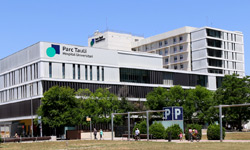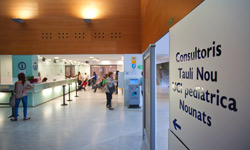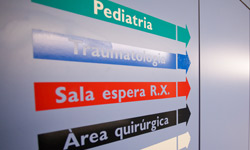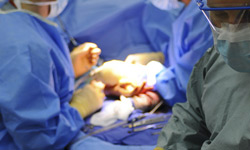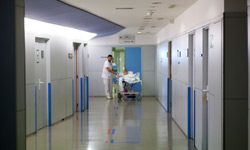Presentation
The Catalan Health Service, within the framework of the program for the development and implementation of the model of care for minority diseases in Catalonia, has designated Parc Taulí as an expert center of the "Network of Clinical Expertise Units in Genetically Based Behavioral Cognitive Behavioral Disorders in Pediatric Age" (XUEC) being, Parc Taulí, the main coordinator in the process of attention to Sexual Cormosome Anomalies.
The Parc Taulí Health Corporation is a Reference Center with extensive experience in the genetic diagnosis and clinical management of patients with Prader-Willi syndrome (SPW). Since 1997, a multidisciplinary team of Geneticists, Pediatricians, Endocrinologists, Nutritionists, Psychiatrists, Neuropsychologists, Orthopedists, Digestologists, Gynecologists and Pulmonologists has been overseeing the clinical treatment and well-being of these patients.
The team was awarded for his career in February 2015 by the Management Committee of the 8th Edition of the World Day of Rare Diseases in Catalonia under the auspices of FEDER (Spanish Federation for Rare Diseases), UAB FECAMM Rare Diseases Platform (Catalan Federation of Rare Diseases) and is a pioneer in Spain in GH therapy in adult patients with Prader-Willi syndrome.
* Nothing on this website is intended to be used for diagnosis or medical treatment. While we carefully review our content, we cannot guarantee or take responsibility for the medical accuracy of all published documents, nor can we assume any responsibility for the content of websites linked from ours.
About us
Case manager
- Núria Capdevila
Pediatrics
Raquel Corripio, Coordinator of Pediatrics at the Prader-Willi Unit (Endocrinology)
- Diana García (Gastroenterology)
- Yolanda Couto (Nutritionist)
- Montserrat García (Neuropediatrics)
- Lorena Joga (Neuropsychology)
- Carme Brun (Clinical Psychology)
- Ariadna Ramírez (Clinical Psychology)
- Susana Pujol (Clinical Psychology)
- Lara Urraca (Clinical Psychology)
- Helena Larramona (Pneumology)
- María Belén Rodríguez (Social Work)
Adult age
Case Box, Adult Coordinator of the Prader-Willi Unit (Endocrinology)
- Olga Giménez (Endocrinology)
- Laura Vigil (Pneumology)
- Valentí Puig (Digestive)
- Josefina Orus (Cardiology)
- Laura Costa (Gynecology)
- Ramón Coronas (Psychiatry)
- Marissol Matamoros (Psychology)
Pediatrics and adulthood
- Carmen Manso (Clinical Genetics)
- Núria Capdevila (Genetic Advice)
- Núria Gimeno Calavia (Orthopaedics and Traumatology)
- Dr. Josep Visa (Ophthalmology)
Laboratory specialists
- Snows Baena
- Ana ruiz
Coordinator of the unit
Raquel Corripio Collado
Information for patients
Disease information
Prader-Willi syndrome (SPW) is a disease of genetic origin with a complex clinical expression as it affects multiple systems of the body. It is considered the most common cause of obesity of genetic origin.
It is estimated that approximately one in 15.000 people is born with SPW. It occurs in both men and women and has been detected in individuals of all races. The name of the syndrome comes from the names of the doctors who first described this disorder in 1956.
As with any syndrome, each person is different and therefore not all characteristics are present in all affected individuals, and the degree of involvement varies significantly from one to another.
- Unit information sheet and access routes
- 25 questions and answers about Prader-Willi
- Prader-Willi Syndrome School Guide
- Prader Willi Association 2022 Educators Day
- Family Information - IPWSO
- Orphanet - The European portal for minority diseases
Patient and family associations
- Prader-Willi Catalonia Association
- Spanish Association of Prader-Willi
- International Prader-Willi Syndrome Organization
- ERDF - Spanish Federation of Rare Diseases
- FECAMM - Catalan Federation of Rare Diseases
- EURORDIS - European Federation of Rare Diseases
News and events
- The Catalan Association Prader-Willi Syndrome gives € 7.000 to Parc Taulí for a study on the effect of growth hormone in adults with this syndrome. enllaç
- EXPERIENCE AND UPDATE IN PRADER-WILLI SYNDROME (SPW). DAY FOR FAMILY MEMBERS AND CARERS
Organized by: Parc Taulí University Hospital (Prader-Willi Syndrome Unit) and the SPW Catalan Association.
Day: Saturday, May 5, 2018
Venue: Auditorium of the University Hospital Parc Taulí
Information for professionals
Shared resources
Collection of documents, guides, templates, diagrams and protocols of interest for other devices in the healthcare system.
Functional circuits
- Flowchart of the Prader-Willi Unit Clinical Practice Model
- Flow chart of the model of care for Rare Diseases
Clinical practice guidelines
- Prader-Willi Syndrome Medical Practice Guide - 1
- Prader-Willi Syndrome Medical Practice Guide - 2
- Growth Hormone Medical Practice Guide in Prader-Willi Syndrome
Templates and model documents
Current clinical trials
We provide you with links to major databases so you can find out what clinical trials are currently being conducted and where they are being conducted.
- Orphanet - The European portal for minority diseases
- REEC - Spanish Clinical Studies Registry
- Clinical Trials
- World Health Organization (International Clinical Trials)
Consultations between professionals
For any type of information or management contact the Liaison Office.
Research and dissemination of knowledge
Below is the link to the Areas and Research Groups of the Rare Diseases Unit: enllaç
Lines of research
- Line 1: Effect of intake on Ghrelin levels in obese patients with Prader Willi syndrome
CENTER: Hospital de Sabadell DATE: 2003
CEIC Code 2003121 (final report 13/12/2006) Own promoter
- Line 2: Evaluation of the current follow-up of patients with Prader-Willi syndrome in our country.
CENTER: Hospital de Sabadell DATE: 2013
CEIC Code 2013613 (final report 4/12/2015) Own promoter
- Line 3: Experience with growth hormone (GH) in children under 2 years of age with Prader-Willi syndrome (SPW) in the Pediatric Endocrinology Unit of Sabadell Hospital.
Registered with clinicaltrialgov: TAU-SPW-201. IP
CENTER: Hospital de Sabadell DATE: 2014-
CEIC Code 2014589 Own promoter
- Line 4: Hypercoagulability in Prader Willi Syndrome ”. Own promoter. CEIC Taulí: approved
Start January 2019
- ZEPHYR, in Pivotal Phase 2b / 3 Randomized, Placebo-Controlled Study of Livoletide, in Novel UnacylatedGhrelin Analog, for the Treatment of Hyperphagia and Food-Related Behaviors in Patients with Prader Willi Syndrome.
Research projects
- "Brain functional connectivity in alternative pathways to food motivation networks in adult patients with Prader-Willi syndrome." Project led by Dra. In Caixàs.
- "Growth Hormone Safety in Patients with SPW Under 2". Project led by Dra. R Corripio
Clinical trials
- "Multicenter, randomized, double-masked, placebo-controlled phase II trial to evaluate the safety, tolerability, and effects of AZP-531, a non-acylated ghrelin analogue, on eating behavior in patients with Prader-Willi syndrome", Promoter Code AZP01-CLI-002 - EudraCT number: 2014-001670-34. 2015-2016. Dra. In boxes, Dra. O. Giménez, Dra. R Corripio and Dra E.Gabau.
- "A randomized, double-blind, placebo-controlled phase 3 trial of beloranib in obese subjects with Prader-Willi syndrome to assess eating behavior, total body weight, and safety for 52 weeks". Promoter Code: Zaf-312. Collaborators: Dra. A caixàs and Dra. O. Giménez, Dra. CEIC. 2015-2018.
- ZEPHYR, in Pivotal Phase 2b / 3 Randomized, Placebo-Controlled Study of Livoletide, in Novel UnacylatedGhrelin Analog, for the Treatment of Hyperphagia and Food-Related Behaviors in Patients with Prader Willi Syndrome.
Dissemination of knowledge
- Paper presented at the III National Congress Prader-Willi Syndrome. "New study on brain connectivity and hunger circuits in Prader-Willi Syndrome." Endocrinological aspects. Barcelona, 4, 5 November 2011.
- Paper “Sharing knowledge in Rare Diseases” A.Caixàs, E.Gabau, J.Rivera, M.Guitart, M.Garcia, R.Corripio. 3ª Conference on the Health Plan of Catalonia 2011-2015. Organization: Department of Health Generalitat de Catalunya, Sitges 13 December 2013.
- Paper presented at the Conference on “Prader-Willi Syndrome, an experience of a reference center” with the paper “Prader-Willi Syndrome in adulthood”, Sabadell, October 25, 2014.
- Communication to the National Congress Prader-Willi Syndrome. "Prader-Willi Syndrome and Brain-Derived Neurotrophic Factor (BDNF)." III Barcelona, 4-5 November 2011.
- Communication to the First Medical-Surgical Congress of Obesity (SEEDO-SECO) "Effect of a standard diet on the concentrations of Brain-Derived Neurotrophic factor (BDNF) in obese patients with and without Prader-Willi syndrome.", Madrid 14- March 15, 2013. PM006. page 31.
- Communication at the 36th Congress of the Spanish Society of Pediatric Endocrinology. "Evaluation of the current follow-up of patients with Prader-Willi syndrome in our environment." Seville, 14-16 May 2014. Rev Esp Pediatr 2014; 5 (suppl) o4 / d3-031, p111.
- Communication at the Congress of the Catalan-Balearic Society of Psychology. "Characteristics of repetitive behaviors related to OCD or Obsessive Compulsive Spectrum Disorder (OCD) in people with Prader-Willi Syndrome."
- Communication at the International Prader-Willi Syndrome Organization Conference (IPWSO).
- "Plasma brain-derived neurotrophic factor (BDNF) concentrations are not modified by a standard meal in adult patients with Prader-Willi syndrome." 8th, Cambridge, UK, 18-21 July 2013. Abstracts book P66 p 135-136.
- Communication at the International Prader-Willi Syndrome Organization Conference (IPWSO). "Whole-brain assessment of functional connectivity in Prader-Willi syndrome." 8th, Cambridge, UK, 18-21 July 2013. Abstracts book P67 p 137-138.
- Communication at the 8th International Prader-Willi Syndrome Organization Conference (IPWSO). “Characteristics of repetitive behavior related to OCD or OCSD disorder in people with Prader-Willi syndrome.”, Cambridge, UK, 18-21 July 2013. Abstracts book P74 p 147-148.
- Communication at the XVI World Congresss of the World Psychiatry Association. “Functional connectivity in Prader-Willi Syndrome: Assessment with functional magnetic resonance imaging.”, Madrid, Spain, 14-18 September 2014.
- Communication to the 57th Congress of the Spanish Society of Endocrinology and Nutrition (SEEN). "Experience of a Prader-Willi Syndrome (SPW) Reference Center." Madrid, 27-29 May 2015. Endocrinology and Nutrition 2015; ; 62 (special congress).
PhD thesis
- Prader-Willi syndrome as a model of obesity: ghrelin, PYY, adiponectin and inflammatory parameters. Reading: 2007.
- Neuropsychology of intellectual development disorder with and without a genetic basis. UAB. Reading 2015.
- Study of brain connectivity and its relationship with hunger-regulating peptides in Prader-Wiilli syndrome. UAB. Expected reading 2017.
How to contact
For any type of information or management contact the Liaison Office.

